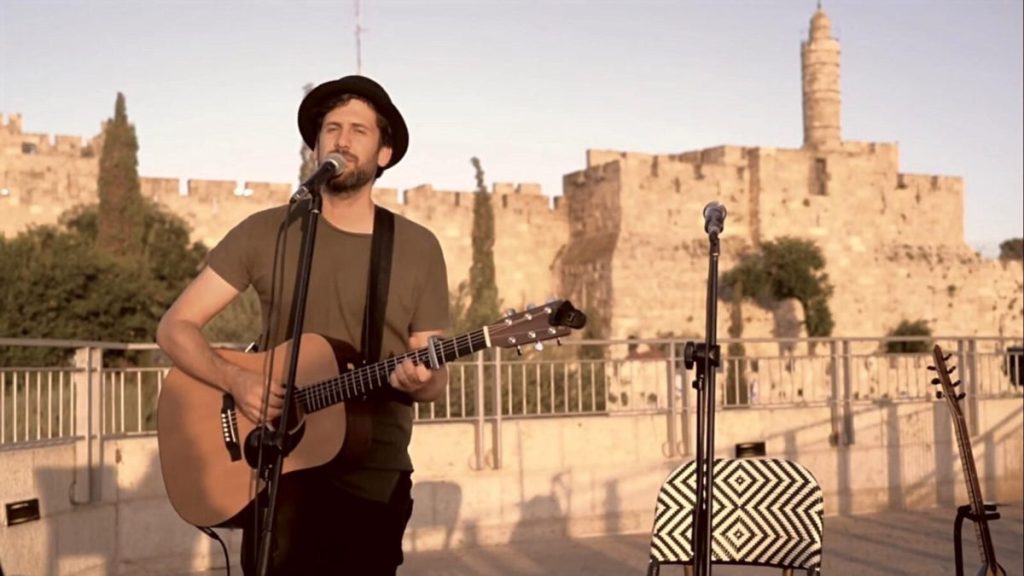“I don’t forget my past. I’m not saying there isn’t a conflict. But we’re here to talk and look each other in the eye like human beings.”
Around the time the coronavirus crisis erupted, Yair Levi’s grandmother fell ill. A musician, Levi looked for a prayer to recite for her and came across a biblical verse that he quickly composed and sang.
The result was “Refa Na,” a soulful healing prayer that went viral.
“It came out within a week and it just exploded in a crazy way, with people who don’t know Hebrew singing and praying that Covid should pass,” Levi said.
“I got covers from all over the world,” he said. “One of the covers I got was by Carine. She first sang it in Hebrew and then in Arabic.”
Carine is Carine Bassili, a Lebanese artist who lives in the United States. While not a singer by profession, she has been working on music for the past couple of years out of a desire to empower people and bring them hope and peace.
The Hebrew song that she came across, she said, resonated with her despite the enmity between Israel and Lebanon.
“I never had any connection to any Jewish people. In my country, they’re supposed to be my enemies,” she said. “But I never considered them as enemies. Our families never taught us to hate.”

Still, Bassili said, she had to work up the courage to get in touch with Levi. But when she did, she asked him whether he’d like to sing it with her in Arabic.
Levi was impressed. “On her part, she’s amazingly brave to be doing it,” he said. “On my part, as someone who was in the army for many years, there was something complex about it for me too. I know Lebanon in a different way.”
Levi was a career officer in the navy commando unit. He left five years ago to pursue his passion for music, and like Bassili, he experienced the difficulties of war.
“She experienced the wars, the jets, scrambling down to the air raid shelters, the bodies, the worst things possible — and so did I. It’s from this place that the cooperation was formed,” he said.
Move forward, but don’t forget the past
“I think that one of the amazing things in this cooperation is that it’s part of a conversation. We got to know one another and understood that both of us aren’t people who are saying ‘Let’s make peace’ by forgetting the past,” he said.
“I don’t forget my past. I’m not saying there isn’t a conflict. But we’re here to talk and look each other in the eye like human beings.”
Bassili concurs. “I’ve been through stuff, but I choose this place because we have to forgive and move forward. We don’t have to forget, but we have to move forward.”
Working with an Israeli artist has been a bittersweet experience, she said.
“It wasn’t easy. I knew I was doing something my country won’t allow. I didn’t want to break rules, but I wanted to do what was right,” she said. “I was scared for a moment, but I knew it was the right thing.”
Their cooperation resulted in the Arabic version of “Refa Na.” Bassili taught Levi the correct pronunciation on a video call.
“I think we did the best we can with his Arabic. I think he’s really good,” Bassili said.
Singing in Arabic, Levi said, has provided some closure. His grandmother, who died after he composed the song for her, spoke Arabic, and he used to practice the Arabic he’d learned in the army when he came home at weekends.
“I suddenly realized that it’s another sort of closure. For me, there’s something in this song that very much revolves around my grandmother. It’s of course already become something beyond that. But for me, at the end of the day, I’m singing for my grandmother and it’s amazing.”
The song comes from verse 13, chapter 12 of Numbers, in which Moses prays for the recovery of his sister Miriam.

Spreading positivity
Responses to the collaboration have been mixed, the artists said, but overall were good.
“I expected the bad responses,” Levi says. “What surprised me was the positive responses because I really didn’t know that side of Lebanon, of people who are interested in peace and don’t hate Israel. There’s a very large public in Lebanon that wants this closeness with Israel and sees something positive in it.”
Bassili also has received all kinds of responses from people in her homeland. She said she doesn’t judge anyone who expresses anger or hurt.
“But we had lots of positive. People cannot go public and say it, but I get a lot of private messages about it,” she said. “We have to spread some good news, to spread positivity, to spread truth and erase those lies. Bring light to the darkness. Hopefully, that will be a way toward helping that.”
The two artists are already working on another project together but are keeping things under wraps.
“We’re doing something that’s mine, hers, and with a few other people. Something quite big in my opinion,” Levi said.
A healing prayer brings Israeli, Lebanese singers together appeared first on ISRAEL21c.
The post Soulful Prayer Brings Israeli, Lebanese Singers Together appeared first on Zenger News.



